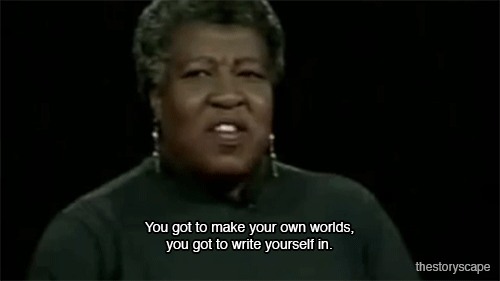Seventy years ago, today, Octavia E. Butler was born in Pasadena, California. An only child named after her mother, Octavia Margaret Guy, Butler was called “Junie” as a child, likely in place of “Junior.” Her father, Laurice James Butler, died when Octavia was seven years old and was raised by her mother and grandmother in a religious household. Her mother was a domestic worker—witnessing the indignities through which her mom persevered in a segregated world informed a good deal of Butler’s writing.
Butler was painfully shy and—despite measuring six-foot tall by age fifteen—“hopeless at sports,” so she would often pass her time reading and writing—despite her dyslexia—at the Pasadena Public Library, out of the line of sight of her bullies. First enraptured with fantastical fiction, she found science fiction by way of magazines like Amazing Stories and stories by Zenna Henderson and Theodore Sturgeon. Though she had been writing her own stories for some time and had decided at ten years old that she would be a writer, she did not start writing her own science fiction stories until she was twelve, after having watched Devil Girl from Mars and deciding that she could totally write a story better than that.
After graduating high school, Butler worked odd jobs to support herself while she attended night classes Pasadena City College. After attaining her associate of arts degree at PCC, she continued taking whatever jobs she could get that would allow her sufficient time to write. Eventually, she enrolled in writing classes at UCLA Extension and wound up attending Screenwriters’ Guild of America’s Open Door Workshop. One of the workshop’s instructors, Harlan Ellison, was duly impressed with Butler’s writing and encouraged her to attend Clarion Science Fiction Writers Workshop. At Clarion, that she came into contact with feminist science fiction author Joanna Russ, met Samuel R. Delaney (who became a long-time friend), and sold two of her stories.
In the five years after Clarion, Butler wrote what would become the first three novels in her Patternist series. It was after the publication of the third—Survivor—that she was finally able to stop taking odd jobs—which had even included a stint as a potato chip inspector—and live entirely off of the money she earned with her writing. Between 1976 and 1984, Butler had published the five-installment Patternist series and Kindred; the latter of which gave her the opportunity to write around the experiences of her mother in segregated California, her own experiences of a rather varied work history, and to address the disdain once expressed by a PCC classmate about Black folks’ perceived subservience to white folks.

In 1984, she won her first Hugo Award for the short story “Speech Sounds.” The next year, Bloodchild, from which “Speech Sounds” was taken, earned her a Hugo, a Locus Award, and a Reader Award from Science Fiction Chronicle. It was also around this time that Butler made her way to South America, visiting the Amazon and the Andes, to do research for the next series she would write: the Xenogenesis trilogy, later published as Lilith’s Brood (which, incidentally, is one of my most favorite book series in the history of foreverness).
Moving into the 1990s, Butler began working on the dystopian Parable or Earthseed series (which is one of my sister’s most favorite book series in the history of foreverness). Set in a future United States that has socially, politically, and economically collapsed, the second book—Parable of the Talents—eerily predicted the practically-made-to-be-a-hashtag campaign slogan of the person currently occupying the Oval Office. So, there’s that. Dystopian United States and uncanny predictions aside, it was also in the ‘90s (1995, to be exact) that Butler became the very first science fiction author to receive the John D. and Catherine T. MacArthur Foundation fellowship.
In the early 2000s, Butler reportedly grappled with both depression and writer’s block, side effects of a medication she was taking for hypertension. Nevertheless, she continued teaching at Clarion and she published a few short stories, as well as her second stand-alone novel, Fledgling—a vampire story (rumor has it she was a fan of the Sookie Stackhouse novels). In 2005, she was inducted into the International Black Writers Hall of Fame at the Gwendolyn Brooks Center at Chicago State University.
Sadly, in February 2006, Octavia Butler died just outside of her home, possibly of a stroke. She was only fifty-eight years old.
Octavia Butler, with dogged persistence, made her way into the annals of science and speculative fiction. She broke into a field long-since (and, to no small extent, still) dominated by white men and their narrative focus, bringing to the genre the long overdue voice of Black feminists. She opened up the genre to a broader audience and brought to the genre clear and poignant critiques of existing power dynamics in the world around her that a middle-class white dude is just going to have a hard time picking up on. Though she was gone far too soon, she had a tremendous impact on the world around her in her fifty-eight years on this planet and her legacy should definitely be celebrated.
So, Happy Birthday, Ms. Butler—wherever you may be. And thank you. Thank you so very much.
Promo photo source: http://lfla.org/event/radio-imagination-octavia-e-butlers-los-angeles/











Leave a Reply